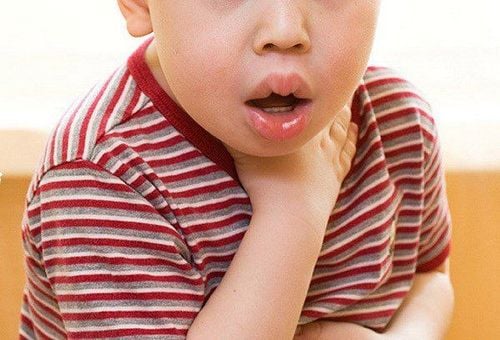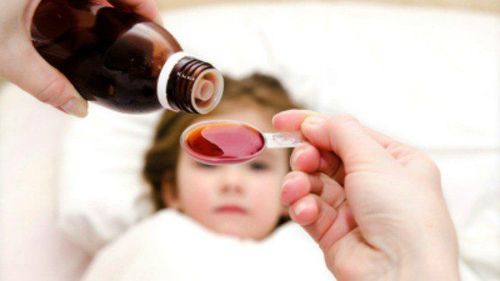This is an automatically translated article.
Hot weather causes a child's body to produce a lot of sweat to cool down, if not cared for properly, the baby is easy to lose water and electrolytes. Along with that, the immature immune system of children is the cause of hot summer diseases such as hand, foot and mouth disease, dengue fever, meningitis...
Below are questions related to children's health issues in the hot summer season, consulted by pediatricians at Vinmec International General Hospital:
Doctor Duong Van Sy - National General Hospital Vinmec Hai Phong Hospital
28: Friend Nguyen Thi Mai (Kien An, Hai Phong): Dear Doctor, My daughter has had dengue fever on the 4th day, Initially she has signs of high fever 39.5 degrees Celsius, vomiting, sometimes cold shivering, after taking the fever reducer 4-6 hours, the fever will return again. From the 3rd day, her condition has improved, I still give her water supplements, dilute porridge, and use Paracetamol to lower her fever. Ask your doctor for more advice on how to take care of a patient with dengue fever, what to do to get better quickly? Thank you doctor.
Doctor Duong Van Sy - Vinmec Hai Phong International General Hospital: Dengue fever occurs all year round but is common and increases in the period from June to September, or outbreaks occur. Many people are confused and don't know what to do with dengue fever?
Her measures to take care of children with dengue fever are very good. In addition, it is necessary to pay attention to the following:
Closely monitor the child's temperature, notify the medical staff at any time if the child has a fever. Use antipyretic drugs for children under the guidance of medical staff, absolutely do not arbitrarily use antipyretic drugs containing Aspirin, Ibuprufen because these drugs increase the risk of bleeding. Daily hygiene of eyes, nose and throat for children with 0.9% physiological saline solution. Give your child soft, liquid, easy-to-digest foods such as porridge, flour, milk. Do not give children foods and drinks that are brown/red in color (coca, pepsi, watermelon, chocolate...) because it is difficult to distinguish when the child vomits blood. Encourage children to drink plenty of water: cooled boiled water, fruit juice (coconut, orange, lemon ..) oresol, hydrite, or diluted porridge... Wear soft, sweat-wicking and special clothing. Pay attention to ensuring the child's skin hygiene: Change clothes and take a quick bath with warm water in the bathroom when the child does not have a fever. Closely monitor the child's condition, detect early warning signs and severe signs for timely handling: Struggling, lethargy, lethargic. Cold extremities, moist skin, hypothermia. Abdominal pain, chest pain, difficulty breathing. Nosebleeds, bleeding gums. Vomiting a lot, vomiting blood, passing black or bloody stools, urinating less.
In addition, absolutely do not bathe or wipe the child's body with cold water because it will cause the outer skin vessels to contract, the internal vessels to dilate, which is very dangerous.
Cases of dengue fever grade 3, 4 should be hospitalized for emergency monitoring and treatment of Western medicine. Particularly, Oriental medicine only treats level one and two dengue fever.
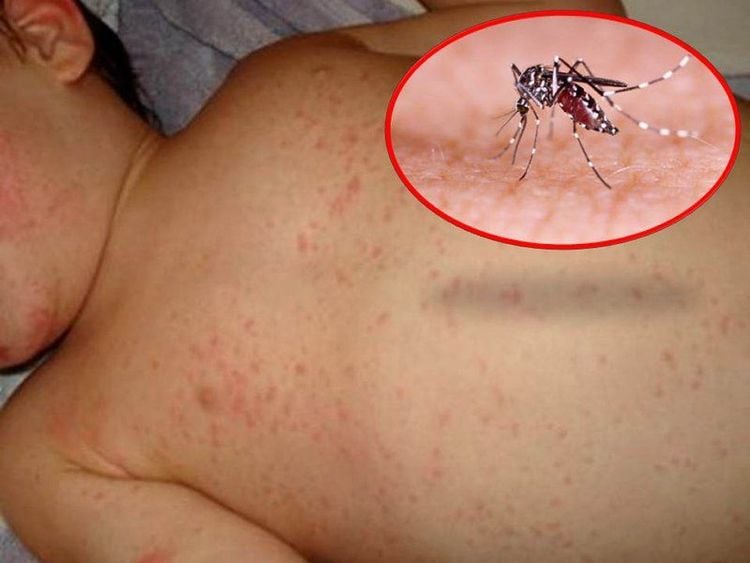
29: Friend Duong Thi Ha (Email address: Duongthithuha...@gmail.com): Hello, doctor. My son is 4 years old, he is usually very active and agile, but today he came home from school with a high fever, lethargy, fatigue, no cough, no phlegm, no nose. There is currently a dengue fever season, so I want to have her tested for dengue. Do you need to fast for a dengue fever test? Thank you.
Doctor Duong Van Sy - Vinmec Hai Phong International General Hospital: Hello!
Dengue fever is an acute infectious disease caused by mosquitoes that transmit the dengue virus. Symptoms of Dengue hemorrhagic fever are usually high fever, fever attacks, sometimes accompanied by chills, goosebumps, red spots of hemorrhage under the skin. The patient's body temperature can reach 39-40 degrees Celsius. If you detect symptoms of dengue fever, you should immediately go to the hospital to be tested for dengue fever and receive timely treatment.
Regarding the question “Does Dengue fever require fasting? ", please answer as follows: Dengue fever test does not require fasting when going to the doctor. Because the test for suspected cases of dengue fever is a blood count test. In which, the two parameters of platelets and blood concentration show that the disease does not change when eating. When there are any symptoms of dengue fever, you need to take your child to the hospital immediately for diagnostic tests to detect early.
30: Mr. Dinh Thanh An (Yen Thuy District, Hoa Binh Province): Hello, Doctor. My daughter has a high fever for many days diagnosed with dengue fever and is currently being treated at home. I have replenished water for him by giving him a lot of filtered water, fruit juice, porridge, soup... but he got very little because he was sick, so he was lazy to eat. I want to give him water, but I don't know if dengue fever can be infused with water? Looking forward to consulting your doctor!
Doctor Duong Van Sy - Vinmec Hai Phong International General Hospital: Hello! Children with dengue fever need to compensate for enough body fluids because the high fever continuously makes the body tired, unable to eat and drink, in addition, the phenomenon of increased vascular permeability causes fluid to escape into the intercellular spaces. However, not everyone understands whether dengue fever can be infused with water and how to properly transmit it.
If the child with dengue fever is still able to eat and drink, it should be rehydrated by natural eating. You can supplement water by giving your child plenty of filtered water, smoothies, juices, soups, porridges...
Give fluids only when prescribed by a doctor in the following cases: The patient eats too poorly; vomiting causes loss of fluids and electrolytes; hypotension; signs of hemoconcentration (increased Hematocrit)...
The amount of infusion is not the same for all patients, it must depend on the condition of each patient. In addition, it is necessary to control other diseases of the patient such as cardiovascular disease, blood pressure, respiratory disease, ... when receiving fluids.
From the 6th day of the disease (the stage of resorption and recovery), if you receive a lot of fluids, it will cause many complications such as heart failure, acute pulmonary edema... affecting your life.
Absolutely do not arbitrarily transmit at home.
Thus, dengue fever can be transfused regardless of the status and stage of the disease. It is necessary to have a doctor's prescription for the most effective care for a child with dengue fever.
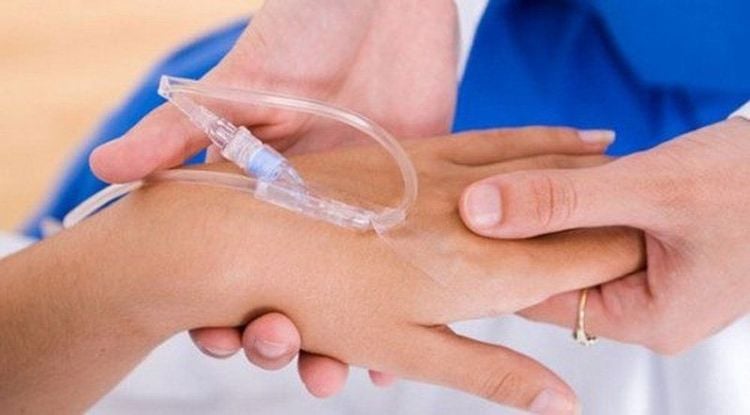
31: Friend Cao Thi Huyen Trang (Viet Hung Urban Area, Long Bien, Hanoi): Doctor, I have a relative with a high fever of over 39 degrees, so I suspect dengue fever because of an epidemic. Can I ask how much does a dengue test cost and how long does it take? Can I order a home test?
Doctor Duong Van Sy - Vinmec Hai Phong International General Hospital: Hello. Dengue fever is an acute, epidemic disease caused by the dengue virus. The disease is spread by mosquitoes that bite an infected person and then transmit the disease to a healthy person through the bite. Therefore, when your child shows signs of suspected dengue fever, you need to take him to the hospital to have a dengue test done right away.
Dengue fever test costs vary depending on the following basic factors:
Type of test: Currently, there are two basic types of dengue detection tests, NS1Ag and Dengue IgM test. - IgG. Depending on the test that the patient chooses to perform, the cost will vary. Usually, the NS1Ag test will cost more.
In addition, the cost of testing will depend on the specific disease condition, the doctor may ask the patient to conduct some other diagnoses to monitor the progress of the disease and have effective treatment solutions. Therefore, the cost of dengue testing in each patient is not the same.
Time to get results: About 30 minutes for quick test. As soon as there are symptoms of dengue fever such as high fever, bleeding under the skin, vomiting, abdominal pain... you need to quickly take your child to be tested for dengue fever as soon as possible, to avoid dangerous complications coming to you. health may occur.
32: Friend Nguyen Bich Ngoc (35 years old, Tran Phu, Ha Dong, Hanoi): Hello doctor, I would like to ask for advice on what to eat for children with dengue fever to increase platelets. My son had dengue fever on the fourth day, he showed signs of continuous vomiting, hematuria, lethargy, fatigue... I took him to the doctor and was diagnosed with thrombocytopenia. I would like to be advised more clearly why dengue fever has low platelet count, how much and what should I give my child to increase platelet count? Thank you!
Doctor Vinmec Hai Phong International General Hospital: Hello. Dengue fever in children can cause serious complications, including thrombocytopenia. Thrombocytopenic purpura is an immunological disease. Anti-platelet antibodies cause platelets to be destroyed in the spleen, resulting in a decrease in the number of platelets in the blood, the body will easily bleed with a slight impact. Please answer your questions as follows:
How much does the platelet count decrease? According to WHO, Thrombocytopenia is defined as a rapid decrease in platelet count or platelet count below 150,000/mm3 (<150 G/L). Thrombocytopenia is considered a criterion for assessing the severity of dengue fever.
Why does dengue fever reduce platelets? Dengue thrombocytopenia is due to the following reasons:
First, The platelet count in dengue decreases when it suppresses the bone marrow (which is the site of platelet production). Second, Platelet count in dengue fever decreases because the blood cells are affected by the virus that causes platelet damage. Third, the antibodies produced during this period destroy a large number of platelets during the period of dengue fever. Fourth: Due to the injury, increased vascular permeability, causing extravasation of blood cells into the intercellular space also reduces blood cells including platelets. Dengue fever eat to increase platelets?
Some fruits: dates, pomegranates, kiwis, papayas, guava Foods rich in vitamin C: Oranges, spinach, broccoli,... Folate-rich foods: asparagus, whole grains, oranges and spinach . Foods rich in vitamin A: pumpkin, carrots, sweet potatoes,.. Foods rich in vitamin B12: salmon, beef, chicken, tuna, turkey... Foods rich in omega-3 fatty acids: seeds flax, walnuts, fish and spinach... Foods rich in antioxidants: raspberries, cranberries, strawberries, walnuts,... Foods rich in anti-inflammatory substances: vegetables, whole grains whole grains, organic beans,... Whole grains Vitamin K rich foods: liver, kale...

33: Friend Le Thu Hang (final year student at University of Commerce): My sister has a 7-year-old child who is suffering from dengue fever and has been treated, now it's the 6th day, then the child's fever has stopped and the fever has started. eating and drinking again but the nodules on the skin have not disappeared. It is not clear if the baby is completely healed. Ask the doctor to help me when will I be completely cured of dengue fever? Should my family continue to take the medicine because I have been taking it for up to 6 days.
Doctor Vinmec Hai Phong International General Hospital: Hello! Dengue fever has a variety of clinical manifestations, ranging from mild to severe. Dengue fever usually lasts 7-10 days, divided into three stages.
When the dengue fever is completely cured depends on many factors such as the patient's condition, care regimen, resistance... Therefore, when the dengue fever is completely cured, each person has a period of time. difference.
Usually, the disease progresses in three stages: the febrile phase, the critical phase, and the recovery phase.
Stage 1: The fever phase lasts for the first 3 days of the disease with the following symptoms: The patient has a sudden high fever of 39-40 degrees Celsius. Fatigue, headache, pain in the eye sockets, pain in the joints, body aches, there may be inflammation of the upper respiratory tract. Loss of appetite, feeling nauseous and vomiting. Congestive skin, may manifest as petechiae under the skin.
Stage 2: Critical stage (or hemorrhagic phase): Usually on the 3rd - 7th day of the disease. Manifestations of fever may decrease or remain feverish, signs of bleeding from mild to severe, there are various bleeding manifestations (due to thrombocytopenia in the blood), a stage where many complications occur.
Stage 3: Recovery phase: The patient has no fever for more than 48 hours, less fatigue, overall better, more appetite and urination, Platelet test begins to increase. Dengue is self-healing, the drugs used for dengue patients are mainly to treat symptoms such as antipyretic, rehydration and electrolytes, anti-bleeding, anti-circulatory failure (if any).
34: Friend Pham Thi Huong (Pho Noi, Hung Yen): Hello, doctor. My daughter is about to be 12 months old, she is 83cm tall and weighs 11kg. I know that children at 12 months can be vaccinated against Japanese encephalitis. Please advise how many types of Japanese encephalitis and Japanese encephalitis vaccines are given? I would like to thank the doctor!
Doctor Vinmec Hai Phong International General Hospital: Hello! Japanese encephalitis is an infectious disease that affects the central nervous system. Encephalitis virus will enter the body through the bloodstream, mainly by mosquito bites. “How many types of Japanese encephalitis vaccine are there” is a common question asked by many parents.
Currently, there are two main vaccines most commonly used to vaccinate children against Japanese encephalitis: the Beijing-1 strain on the mouse brain and the inactivated vaccine made from the Nakayama antigen virus strain. - Yoken.
These are two vaccines that cause basic immunity by 2 doses 7-14 days apart. In addition, there is another type of vaccine to prevent Japanese encephalitis made from the SA-14-14-2 antigenic virus strain on yellow ground mouse kidney cells. This vaccine is widely manufactured in China and has been tested and proven to be safe and effective for young children.
About the question “How many injections are given to Japanese encephalitis? ”, you can take your child for Japanese encephalitis vaccine at the following times:
First shot: When the child is 12 months old. 2nd injection: 1 to 2 weeks after the first injection. Injection 3: At least 1 year after the first injection. After these 3 injections, parents should still give their children a booster shot every 3 years until the child is 15 years old. Currently, the Department of Preventive Medicine under the Ministry of Health has been implementing free vaccination against Japanese encephalitis vaccine for children aged 1-5 years old in the program "National Expanded Immunization" at health stations. commune health care with a schedule of 3 injections. If you have not had the opportunity to take your child to the expanded immunization sessions, parents can take their children to the vaccination service facilities to ensure that their children are fully vaccinated.
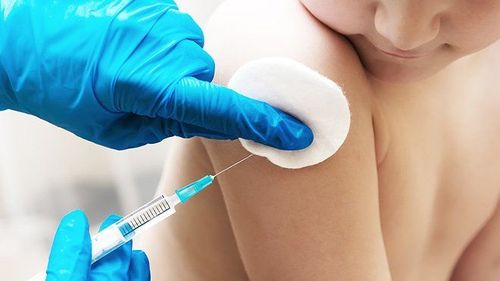
35: Mr. Khuat Van Thang (Real Estate Salesperson): Hello, Doctor. My son was 28 months old, when he was 12 months old, he had the 1st Japanese Encephalitis vaccine. After 2 weeks, the 2nd dose. He was reminded by the doctor to schedule the 3rd injection one year after the 2nd injection. However, because of the busy schedule, the family forgot to give him 3 injections of Japanese Encephalitis. Now that I am 4 months past the vaccination schedule, can I get additional shots and when will the 3rd dose of Japanese encephalitis vaccine be given? Thank you.
Doctor Vinmec Hai Phong International General Hospital: Hello. Japanese encephalitis vaccine is one of the important vaccines in the National Expanded Immunization Program of the Ministry of Health. Vaccination on schedule and in full doses is the best way to prevent the risk of Japanese encephalitis. The Japanese encephalitis vaccine schedule includes 3 doses:
1st dose at 1 year old 1st dose 2nd dose after the nose 1 from 1-2 weeks. 3rd injection one year after 2nd dose. Every 3-4 years, it is necessary to have a booster shot until the child is 15 years old. There are many cases where parents give their children the 1st and 2nd dose of Japanese encephalitis vaccine but do not know the 3rd dose of Japanese encephalitis vaccine. when, leading to forgetting to give your child the 3rd dose of Japanese encephalitis vaccine. If you only get 1 dose of Japanese encephalitis vaccine, the child is not able to fight the virus that causes the disease. After being vaccinated with Japanese encephalitis vaccine, the child was able to produce resistance, protecting the body from the vaccine with an efficiency of about 80%. Vaccination against Japanese encephalitis 3rd dose, the prevention rate is up to 90-95%. However, the preventive effect only lasts for about 3 years, so children need to be vaccinated again every 3-4 years. Thus, in case you forget to inject the 3rd dose of Japanese encephalitis, you can continue to inject the next dose without giving the child the injection from the beginning.
36: Friend Tuyet Anh (Email address: Nguyentuyetanh30...@gmail.com): Please tell me about the new Japanese Encephalitis Vaccine. I heard that recently, Vietnam has imported a new batch of Japanese encephalitis vaccine called imojev and can be given to children from 9 months old, which is earlier than the old one. However, there is not much information about this vaccine. Please ask the doctor to provide more information so that mothers like me have more choices. Thank you brothers and sisters!
Doctor Vinmec Hai Phong International General Hospital: Hello. Japanese encephalitis is an infectious disease that circulates in Vietnam often in the summer, so it is also known as summer encephalitis. The disease often leaves severe sequelae and even causes death. The disease is common in children < 15 years old, especially between the ages of 2 and 7 years old.
Currently, the Japanese Encephalitis vaccine is the Jevax vaccine included in the national expanded vaccination program and injection service at medical facilities throughout the country. Schedule 3 injections, 1st dose when the child is from 12 months old.
Since 2019, a new Japanese encephalitis vaccine called Imojev vaccine produced by international pharmaceutical company Sanofi Pasteur using advanced technology has been used at a number of vaccination centers in Vietnam. Japanese encephalitis vaccine imojev helps contribute to early immunity, gives high protection efficiency, and limits side effects. Imojev is being used in national immunization programs in Australia, Taiwan, Thailand, and Malaysia.
New Japanese encephalitis vaccine, given as early as 9 months old, helps protect against disease earlier than the old generation Jevax vaccine. About the vaccination schedule:
Japanese encephalitis vaccine Imojev injects a basic dose of 0.5ml of reconstituted vaccine to people 9 months of age and older. Give your child a booster dose 12 to 24 months after the primary dose. According to the manufacturer's instructions, this vaccine can be given to adults over 18 years of age as a single dose without the need for a booster. Alternatively, you can use the Japanese encephalitis vaccine Imojev as a booster for children who have received the primary dose of the inactivated Japanese encephalitis vaccine jevax.
Unanswered questions from readers will be answered by Vinmec via email. Thank you for following along!





![[Vinmec - Q&A with experts] Number 02: Children's health in hot season (Part 2)](/static/uploads/20190724_082648_029405_tre_em_max_1800x1800_jpg_6420fc1d62.jpg)

![[Vinmec - Q&A with experts] Number 02: Children's health in hot season (Part 1)](/static/uploads/small_20190723_082829_863235_Banner_FB_1200x628_max_1800x1800_png_982bf67b1c.png)
